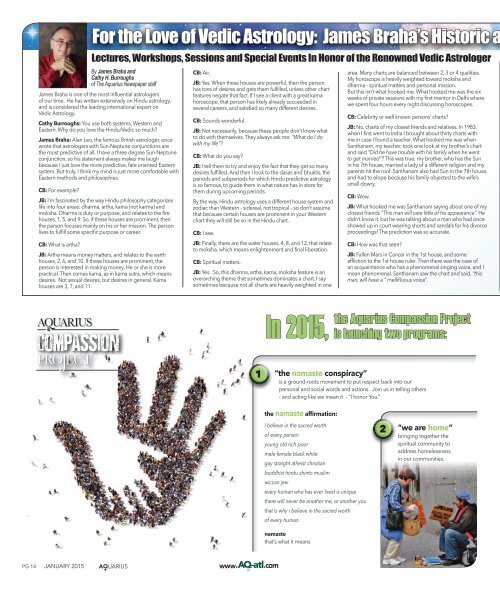Living Authentically
You also want an ePaper? Increase the reach of your titles
YUMPU automatically turns print PDFs into web optimized ePapers that Google loves.
For the Love of Vedic Astrology: James Braha’s Historic a<br />
Lectures, Workshops, Sessions and Special Events In Honor of the Renowned Vedic Astrologer<br />
By James Braha and<br />
Cathy H. Burroughs<br />
of The Aquarius Newspaper staff<br />
James Braha is one of the most influential astrologers<br />
of our time. He has written extensively on Hindu astrology,<br />
and is considered the leading international expert on<br />
Vedic Astrology.<br />
Cathy Burroughs: You use both systems, Western and<br />
Eastern. Why do you love the Hindu/Vedic so much<br />
James Braha: Alan Leo, the famous British astrologer, once<br />
wrote that astrologers with Sun-Neptune conjunctions are<br />
the most predictive of all. I have a three degree Sun-Neptune<br />
conjunction, so his statement always makes me laugh<br />
because I just love the more predictive, fate oriented Eastern<br />
system. But truly, I think my mind is just more comfortable with<br />
Eastern methods and philosophies.<br />
CB: For example<br />
JB: I’m fascinated by the way Hindu philosophy categorizes<br />
life into four areas: dharma, artha, kama (not karma) and<br />
moksha. Dharma is duty or purpose, and relates to the fire<br />
houses, 1, 5, and 9. So, if these houses are prominent, then<br />
the person focuses mainly on his or her mission. The person<br />
lives to fulfill some specific purpose or career.<br />
CB: What is artha<br />
JB: Artha means money matters, and relates to the earth<br />
houses, 2, 6, and 10. If these houses are prominent, the<br />
person is interested in making money. He or she is more<br />
practical. Then comes kama, as in kama sutra, which means<br />
desires. Not sexual desires, but desires in general. Kama<br />
houses are 3, 7, and 11.<br />
CB: Air.<br />
JB: Yes. When these houses are powerful, then the person<br />
has tons of desires and gets them fulfilled, unless other chart<br />
features negate that fact. If I see a client with a great kama<br />
horoscope, that person has likely already succeeded in<br />
several careers, and satisfied so many different desires.<br />
CB: Sounds wonderful.<br />
JB: Not necessarily, because these people don’t know what<br />
to do with themselves. They always ask me: “What do I do<br />
with my life”<br />
CB: What do you say<br />
JB: I tell them to try and enjoy the fact that they get so many<br />
desires fulfilled. And then I look to the dasas and bhuktis, the<br />
periods and subperiods for which Hindu predictive astrology<br />
is so famous, to guide them in what nature has in store for<br />
them during upcoming periods.<br />
By the way, Hindu astrology uses a different house system and<br />
zodiac than Western - sidereal, not tropical – so don’t assume<br />
that because certain houses are prominent in your Western<br />
chart they will still be so in the Hindu chart.<br />
CB: I see.<br />
JB: Finally, there are the water houses, 4, 8, and 12, that relate<br />
to moksha, which means enlightenment and final liberation.<br />
CB: Spiritual matters.<br />
JB: Yes. So, this dharma, artha, kama, moksha feature is an<br />
overarching theme that sometimes dominates a chart. I say<br />
sometimes because not all charts are heavily weighted in one<br />
area. Many charts are balanced between 2, 3 or 4 qualities.<br />
My horoscope is heavily weighted toward moksha and<br />
dharma - spiritual matters and personal mission.<br />
But this isn’t what hooked me. What hooked me was the six<br />
weeks of private sessions with my first mentor in Delhi where<br />
we spent four hours every night discussing horoscopes.<br />
CB: Celebrity or well known persons’ charts<br />
JB: No, charts of my closest friends and relatives. In 1983,<br />
when I first went to India I brought about thirty charts with<br />
me in case I found a teacher. What hooked me was when<br />
Santhanam, my teacher, took one look at my brother’s chart<br />
and said “Did he have trouble with his family when he went<br />
to get married” This was true; my brother, who has the Sun<br />
in his 7th house, married a lady of a different religion and my<br />
parents hit the roof. Santhanam also had Sun in the 7th house,<br />
and had to elope because his family objected to the wife’s<br />
small dowry.<br />
CB: Wow.<br />
JB: What hooked me was Santhanam saying about one of my<br />
closest friends “This man will care little of his appearance”. He<br />
didn’t know it, but he was talking about a man who had once<br />
showed up in court wearing shorts and sandals for his divorce<br />
proceedings! The prediction was so accurate.<br />
CB: How was that seen<br />
JB: Fallen Mars in Cancer in the 1st house, and some<br />
affliction to the 1st house ruler. Then there was the case of<br />
an acquaintance who has a phenomenal singing voice, and I<br />
mean phenomenal. Santhanam saw the chart and said, “this<br />
man, will have a “ mellifluous voice”.<br />
AQUARIUS<br />
In 2015,<br />
the Aquarius Compassion Project<br />
is launching two programs:<br />
PROJECT<br />
1<br />
“the namaste conspiracy”<br />
is a ground-roots movement to put respect back into our<br />
personal and social words and actions. Join us in telling others<br />
- and acting like we mean it - “I honor You.”<br />
the namaste affirmation:<br />
I believe in the sacred worth<br />
of every person<br />
young old rich poor<br />
male female black white<br />
gay straight atheist christian<br />
buddhist hindu shinto muslim<br />
wiccan jew<br />
every human who has ever lived is unique<br />
there will never be another me, or another you<br />
that is why i believe in the sacred worth<br />
of every human<br />
namaste<br />
that’s what it means<br />
2<br />
“we are home”<br />
bringing together the<br />
spiritual community to<br />
address homelessness<br />
in our communities.<br />
PG 14 JANUARY 2015 AQUARIUS<br />
•<br />
www. AQ -atl.com<br />
•<br />
The principle of compassion lies at the heart of all religious, ethical and spiritual traditions,<br />
calling us always to treat all others as we wish to be treated ourselves. Compassion impels us<br />
to work tirelessly to alleviate the suffering of our fellow creatures, to dethrone ourselves from<br />
the centre of our world and put another there, and to honor the inviolable sanctity of every<br />
single human being, treating everybody, without exception, with absolute justice, equity and<br />
respect.<br />
It is also necessary in both public and private life to refrain consistently and empathically<br />
from inflicting pain. To act or speak violently out of spite, chauvinism, or self-interest, to<br />
impoverish, exploit or deny basic rights to anybody, and to incite hatred by denigrating<br />
others—even our enemies—is a denial of our common humanity. We acknowledge that we<br />
have failed to live compassionately and that some have even increased the sum of human<br />
misery in the name of religion.



